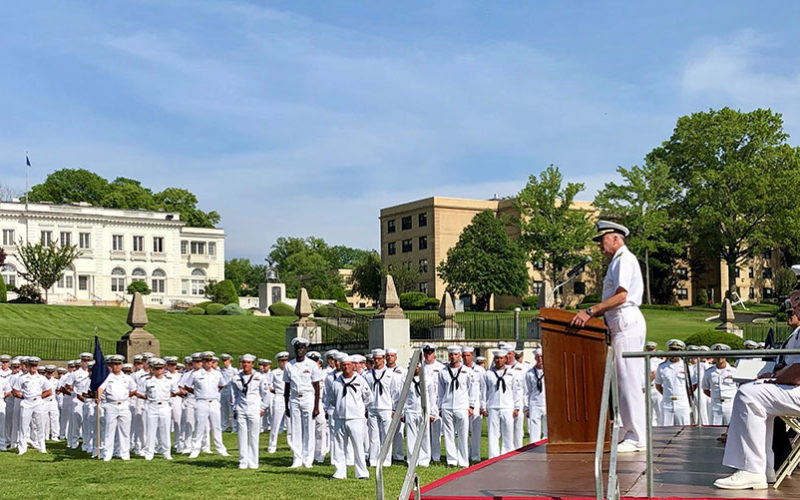
The U.S. Merchant Marine Academy (USMMA) and Maersk Line Ltd. are facing scrutiny after a female cadet shared a detailed account of her rape aboard a merchant ship during Sea Year training.
The cadet made the allegation in an anonymous post on a whistleblower website that includes other stories of harassment and sexual assault from men and women during Sea Year.
In the post, the victim describes in detail how she and another Sea Year cadet were goaded into drinking on a Maersk Line cargo ship. The victim awoke the next morning naked with blood on her sheets and hazy recollections of her sexual assault. She recalled her supervisor, the ship’s first assistant engineer in his 60s, committing sexual acts without her consent.
“I was in a state of total shock,” the victim, then 19, wrote in the Maritime Legal Aid & Advocacy website post. She is now a senior at USMMA.
“For at least 20 minutes I sat there on my bed just looking at everything, looking at the scene, looking at my wet clothes, trying to piece together a timeline, and trying to process the fact that I had actually been raped,” the post continued. “I was completely terrified. I was the only girl on the ship, and we had about two weeks until we even reached the next port.”
Professional Mariner could not independently verify details of the incident, and multiple attempts to reach Maritime Legal Aid & Advocacy founder J. Ryan Melogy were not successful.
The name of the ship on which the incident occurred has not been publicly released, but Maersk has identified the vessel and is investigating the allegation. The Danish shipper said it is cooperating with USMMA, labor unions that represent the officers and crew, and federal authorities.
“Maersk Line Ltd. has strict zero-tolerance policies regarding alcohol use and sexual assault/sexual harassment on its vessels in full compliance with U.S. government regulations,” the company said in a prepared statement. “As part of the investigation process, the master, chief engineer, first assistant engineer and two junior engineers have been suspended pending the outcome of the investigation.”
Maersk spokesman Tom Boyd confirmed the suspended crewmembers worked with the cadet. The men were not named publicly.
USMMA, located in Kings Point, N.Y., referred the victim’s post to the Coast Guard Investigative Service on Sept. 28, a day after it appeared online. The academy reiterated its zero-tolerance policy for sexual harassment and assault, and said it is ready to provide support to the victim and other sexual assault survivors.
“As we determine the appropriate steps required to increase and ensure the safety of USMMA students, we pledge to listen to and work closely with the entire USMMA community including students, parents and alumni,” the academy said in a statement.
Senior officials at the U.S. Department of Transportation and the Maritime Administration (MarAd) made resources available to the victim and the broader Kings Point community. In a statement, the agencies said they are working to determine “the appropriate steps required to increase and ensure the safety of our midshipmen.”
“We especially want our students to know that we value their voices and want to make sure they are part of any decisions that could potentially affect our Sea Year training program,” the statement said.
These are not the first allegations of sexual assault occurring during Sea Year. The program, which dates to 1942, pairs two cadets and places them aboard U.S.-flagged merchant or government ships during their sophomore and junior years. MarAd in 2016 suspended Sea Year for about six months following reports of cadets facing sexual harassment, assault, bullying and hazing while on ships.
Separately, USMMA officials continue to work to change the culture on the Kings Point campus. Multiple reports from the mid-2010s identified longstanding and widely recognized problems related to sexual harassment and assault.
A culture audit of Kings Point cadets released in late 2016 found that the campus climate was negatively affected by behavior cadets bring back to the academy after Sea Year. “Their observations were that when midshipmen return to campus after working and living with more freedom and responsibilities on ships, some return with an increase in behaviors related to alcohol consumption, smoking, lewd talk and lack of respect for women,” according to the report prepared by the Logistics Management Institute.
Claims made in the anonymous post by the Kings Point victim aligned with those observations. The cadet recalled being subject to demeaning and crude comments on the Maersk ship, as well as overt romantic passes from the first assistant engineer well before the assault.
After the assault, she said, he again made a pass at her, and when rebuffed, said nobody would believe her story. As the only female sailor on the ship and a relative newcomer, those words resonated. She confided in her male Sea Year partner but told nobody else, including the captain.
“Back in my room I decided that the only thing I could do was to tough it out. No one was going to believe me, and toughing it out was the only option I felt like I had,” she wrote.
“The next 50 days were horrible,” the post continued. “I had to continue working for the gross man who raped me, had to see him all the time, every day. And every man who had been in that room drinking that night knew that something had happened to me.”
The cadet returned to campus and became a victim advocate. She has since learned of at least five women out of 50 in her class who said they were raped during Sea Year, and at least 10 women total on campus.
The Maritime Legal Aid & Advocacy website mostly contains stories from women of abuse and harassment while working on ships. But several male sailors recalled harassment, unwanted sexual touching and other abuse during Sea Year and on the USMMA campus.
Ally Cedeno, the founder of the nonprofit Women Offshore Foundation, believes most female mariners have faced some form of sexual harassment or worse while at sea. There is no reliable data showing how common it is, she said, because incidents go unreported.
One reason is because many incidents happen with alcohol present, which could lead to sanctions against the victim solely for reporting circumstances of the assault.
“When alcohol is involved, especially as a mariner, you don’t want to worry about losing your license or have to admit to being intoxicated or incapacitated. That is a major factor for some cases,” Cedeno said. “As an industry, we need to learn how to better support victims and provide some sort of amnesty so individuals feel they can report their abusers without putting their career or license at risk.”
Other changes also could have a meaningful impact, according to Cedeno, a 2008 USMMA graduate who is licensed as a chief mate of unlimited tonnage and a dynamic-positioning operator. One is to believe women when they make allegations of this kind. Another is to develop a workplace culture where employees can trust that reports of this nature will be taken seriously.
As of press time, neither MarAd nor USMMA had made any decisions impacting the future of Sea Year.

